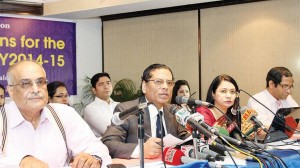Measures to boost stagnant investment will be the biggest challenge amid growing concerns over prevailing insecurity of individuals and property in the country, Center for Policy Dialogue (CPD) said yesterday.
It said investment that remained sluggish over the years is yet to pick up after the election due to unfavorable business environment, as the economy moved from the phase of political unrest to the phase of political uncertainty.
The local research think tank made the observations at a press briefing on budget recommendations for fiscal 2014-15 in Dhaka.
“Individual security is now under threat, further affecting already stagnant investment,” said CPD distinguished fellow Debapriya Bhattacharya, pointing fingers at the recently surging abduction incidents in the country.
“Under such situation, there are possible chances for capital flights, creating difficulties in the budget financing,” he said.
The wheels of existing industries restarted after post-poll period because of seemingly easiness in the political field, but uncertainty and uneasiness still hunted mid-term big investment, he said.
“Fundamentally, the prevailing condition are unlikely to be removed until a participatory political process is not brought back for holding a credible election,” said CPD distinguished fellow.
Terming the government’s sixth five-year plan for the development, he said the plan has become impractical to implement considering the existing economic reality. “Now, it is time to reevaluate the plan.”
CPD Executive Director Prof Mustafizur Rahman said only incentives cannot accelerate investment growth, increase of qualitative and quantitative investment should be taken into account. “Building up institutional capacity and good governance is also pre-requisite to achieve the desired growth.”
CPD Research Director Fahmid Khatun presented a paper on the budget proposals and said, along with economic factors, non-economic ones also play an equally critical role in contributing to socio-economic development of Bangladesh.
“Traditional non-economic factors – weak implementation, oversight and reforms capacities – underpin social and political environment, indirectly affecting the macroeconomic performance,” she said.
Besides traditional non-economic factors, new issues have emerged, she said, adding that new dimensions have been added by the continuation of democratic disquiet in the backdrop of the recent non-participatory national elections. “This protracted political uncertainty is definitely undercutting investor confidence in the short if not medium term.”
Highlighting present macroeconomic scenario, she said it is ‘disquieting’ and the looming uncertainties afflicting business and investment outlook has continued to persist with adverse implications for performance indicators.
The key note paper noted that the next budget should go for supportive fiscal measures to create an enabling business environment towards enhanced production and higher investment.
The CPD recommended giving special incentives for non-RMG export-oriented industries to improve their competitiveness in export market, allowing nationalised commercial banks to mobilise the required capital from the capital market by off-loading shares and increase of export development fund from the existing of Tk120 crore to support export-oriented industries.
It said the government needs to come out with an effective exit plan for the quick rental plans. A total of 16 power plants with a total capacity of more than 1,400 megawatt were set to expire by 2015.
It said annual development programme (ADP) allocation for the development of railway sector needs to be increased and the government may consider an upwards revision of the exemption limit for personal income tax to Tk300,000.
About the corporate tax it said the demand for business community for lowering the corporate tax rates on the grounds that it is high compared to other competing countries of Asia is not true. “The average corporate tax rate of Bangladesh is one of the lowest in South Asia.”
The government should go for a number of reform measures targeting public sector enterprises and organisations to improve their operational efficiency and competitive practices, it said.
“For example, the board of investment should be reorganised appropriately with a view to transform it into an effective investment promotion agency,” said Fahmida.
CPD also proposed enhancing the profile and capacity of the Implementation Monitoring and Evaluation Division (IMED) so that it can deploy modern processes and techniques while monitoring the implementation of development projects.
Source: Dhaka Tribune










